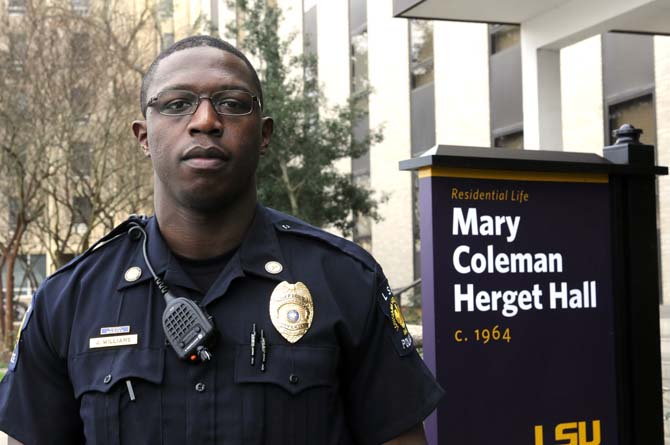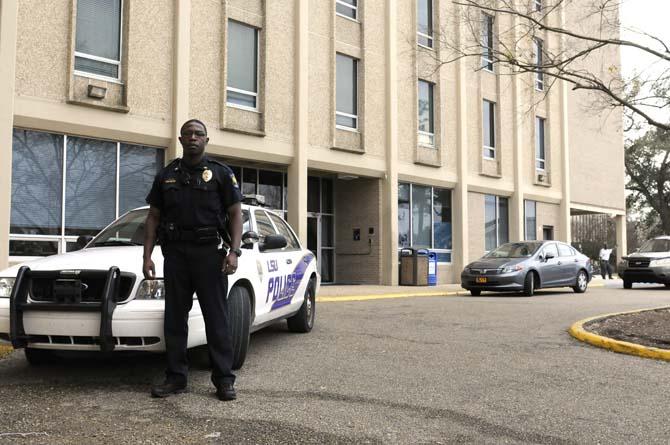Students living in dorms already have RAs knocking on their doors, and a new program will have police hanging out in their lobbies.
The LSU Police Department is collaborating with Residential Life in “Adopt-A-Hall,” an effort to enhance community policing and relationships with students, according to LSUPD Spokesman Capt. Cory Lalonde.
Lalonde said the program is an effort to prevent crime, and is not in response to any event or recurring problem on campus. He said the officers will not have required time to spend at the residential halls and will find their own time to stop by the dorms.
Six volunteer officers will be assigned to Evangeline Circle, the Pentagon, Broussard Hall and Herget Hall and will make frequent stops at the residence halls to address student’s questions and concerns regarding LSUPD and campus safety, Lalonde said.
According to LSUPD records, these halls account for more than half the crimes committed in residence halls in 2011 and 2012.
Lalonde said there is no exact timeline for when the program will be activated campus-wide, but it will begin on a small scale this week.
Residential Life Spokesman Jonathon Hyde said the Adopt-A-Hall program has four goals: increasing positive visibility; creating a good relationship between LSUPD, ResLife staff and students; promoting safety and providing educational opportunities for residents.
“It is still a pilot program, and we will use the next few weeks to fine-tune the organization,” Lalonde said. “We feel this is a big move to close the gap between police and residents on campus.”
In 2011, 141 crimes were reported to LSUPD that took place in residence halls, 66 of which happened in one of the aforementioned halls. In 2012, there were 117 total crimes in residence halls, and 63 were in these four halls.
Herget Hall had the largest number of crimes, with 34 in 2011 and 15 in 2012. Herget had 24 cases of criminal damage in 2011 that significantly bolstered the number. Herget also accounted for the most thefts and batteries in the past two years, with seven and three, respectively.
Broussard Hall had the most cases of illegal drug use, with seven reported to LSUPD in the last two years. Taylor Hall in the Pentagon and Evangeline Hall both had five reported cases of illegal drug use.
Other universities have similar programs that unite residential life with the police department, but they are not common.
At Louisiana campuses, only Southeastern University has a bond between police and dorms, and that is because the university police office is located in one of the residence halls, according to Southeastern’s website.
Across the nation, police taking an active role in dorm life is not as uncommon. The University of Akron in Ohio has a similar program in which “officers assigned to the residence halls visit them daily and in the evenings, and get to know individual students and groups,” according to Akron’s website.
Many universities, including Tulane, have a police “escort” service that provides students with a rides between their classes and their cars in the evenings, according to Tulane’s website.
However, none of the Southeastern Conference schools implement a program with police assigned to dorms. Most universities have police safety programs presented in dorms and to freshmen, but that is the extent of the personal relationships between students and police.
Hyde said LSUPD will attend staff meetings and other dorm programs in order to attain the four goals of the program.
“We are going to test the program out and see if it works and students like it,” Hyde said. “If so, we will try to expand it across campus.”
Biological sciences freshman Brennan Robards said the program is a good idea.
“As big as Herget is, people could use someone to talk to if they felt unsafe or depressed,” Robards said. “I would feel safer with cops at the dorm.”
Brennan Hebert, chemical engineering freshman, said he thinks increased police presence will make students uncomfortable.
“I would feel watched if police were always in my dorm,” Hebert said. “We are in college and should be trusted. Stuff happens here, but not every day. Kids here might rebel against the police.”
There have been several recent issues with police in close contact with students in dorms.
In December 2012, a University of Kentucky student posted a video of a campus police officer entering his dorm room without permission and with physicality, resulting in the officer being fired, according to WDRB news in Louisville.
In 2007, students at the University of Massachusetts planned a two-day protest of class in response to, among other things, “aggressive police patrols of dormitories,” according to a Boston.com article.





